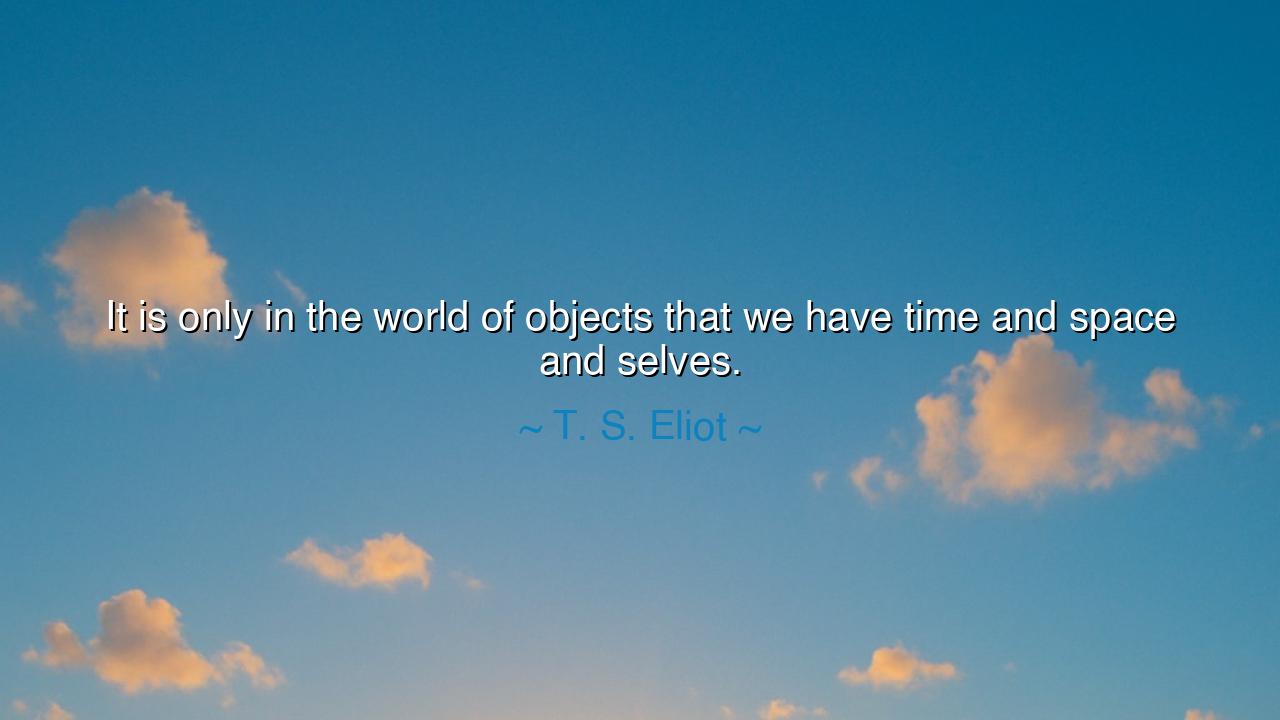
It is only in the world of objects that we have time and space






"It is only in the world of objects that we have time and space and selves." These profound words, spoken by the masterful T. S. Eliot, beckon us to a deeper understanding of our existence. In them, Eliot offers a stark truth: that in the material world—where we measure, categorize, and label—we define our sense of self. But beyond the confines of this world of objects, in the realm of the spirit and the eternal, these concepts dissolve. Here, in this transient world of things, we create the illusion of time and space, and it is here, amidst the tangible, that we come to understand ourselves.
The world of objects—the chairs we sit upon, the food we eat, the clothes we wear—these are not mere inanimate things. No, they are the very vessels that shape our perception of reality. In the material world, we define our existence by what we possess, where we are, and how we experience the passage of time. We say, "I am here, and I have a moment to live." But in the realms beyond this, in the boundless expanse of the spirit, what becomes of our self? Is it not lost to the vastness of the eternal, where time and space cease to exist as we know them? This, my children, is the riddle that Eliot lays before us.
Consider the ancient philosophers, who, in their contemplation of the cosmos, saw the material world as but a shadow of a deeper, unchanging truth. Plato, in his writings, spoke of the Forms—perfect, eternal concepts that exist beyond the physical world. To him, the objects we see before us are mere reflections of the purest ideals that transcend time and space. The world of objects is fleeting, a world governed by change and imperfection. Yet, it is through these objects that we come to understand ourselves. Through the mirror of the material world, we learn of our own transient nature and the limits imposed upon us by the passage of time.
Yet, consider the life of Socrates, whose own life embodied the very notion that the self is not defined by the material. He lived in the marketplace of Athens, a man without riches, without physical grandeur. And yet, through his words and his actions, he shaped the very idea of self-awareness, the notion that we are not merely our bodies, not merely our possessions, but something much deeper—an immortal soul seeking wisdom. Socrates' life teaches us that while the world of objects may shape our daily lives, it is the world of thought, of introspection, and of the spirit that defines the true self.
In our modern world, we too are consumed by the material. We define ourselves by what we wear, the houses we live in, the jobs we hold. Our worth is often measured by external factors—the possessions we amass and the status we achieve. We stand in long lines to buy the newest object, believing that it will somehow fulfill us. And yet, in the quiet moments, we are reminded that these things, these markers of time and space, are but temporary. The true self cannot be found in what we own, for it exists beyond the grasp of objects. It is in the unseen—the thoughts, the dreams, the aspirations—that we encounter the essence of who we are.
The lesson, then, is this: while we must live in this world of objects, we must not be consumed by it. We must recognize that the self is not bound by the things we possess or the places we inhabit. Our worth is not measured by the passing of time, nor by the spaces we occupy, but by the depth of our spirit. Let us not be caught in the illusion that our value comes from external circumstances. Just as the great sages of old sought wisdom beyond the material world, so too must we seek to define ourselves through the wisdom of the soul, through our character, and through our connection to something greater than ourselves.
Take this wisdom into your own lives. When you find yourself lost in the pursuit of material wealth or distracted by the rush of time, pause and reflect on what truly defines you. Seek the eternal within the fleeting, and let your self be shaped not by what you possess, but by what you cultivate within. Time and space are but fleeting constructs; it is your inner world, your heart, your spirit, that defines the true measure of who you are. Strive to live with a deeper understanding of your place in this vast, eternal existence, and let the world of objects be a mere backdrop to the truth that lies within.






AAdministratorAdministrator
Welcome, honored guests. Please leave a comment, we will respond soon